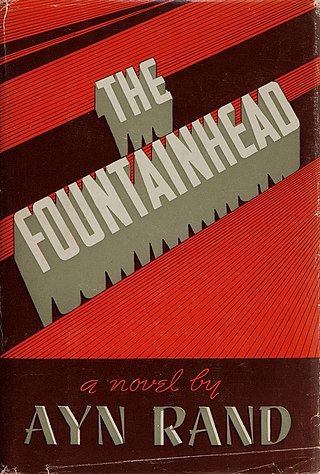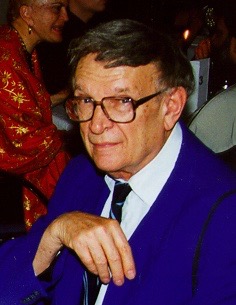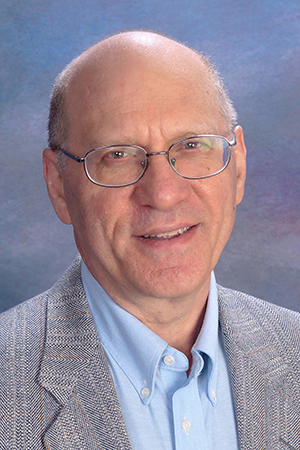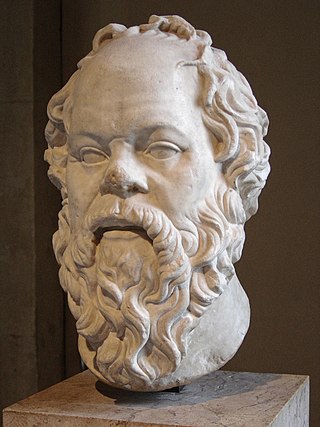
Alice O'Connor, better known by her pen name Ayn Rand, was a Russian-born American author and philosopher. She is known for her fiction and for developing a philosophical system she named Objectivism. Born and educated in Russia, she moved to the United States in 1926. After two early novels that were initially unsuccessful and two Broadway plays, Rand achieved fame with her 1943 novel The Fountainhead. In 1957, she published her best-selling work, the novel Atlas Shrugged. Afterward, until her death in 1982, she turned to non-fiction to promote her philosophy, publishing her own periodicals and releasing several collections of essays.
Objectivism is a philosophical system named and developed by Russian-American writer and philosopher Ayn Rand. She described it as "the concept of man as a heroic being, with his own happiness as the moral purpose of his life, with productive achievement as his noblest activity, and reason as his only absolute".

Thomas Stearns Eliot was a poet, essayist, publisher, playwright, literary critic and editor. He is considered to be one of the 20th century's greatest poets, as well as a central figure in English-language Modernist poetry. His use of language, writing style, and verse structure reinvigorated English poetry. He is also noted for his critical essays, which often reevaluated long-held cultural beliefs.

The Fountainhead is a 1943 novel by Russian-American author Ayn Rand, her first major literary success. The novel's protagonist, Howard Roark, is an intransigent young architect who battles against conventional standards and refuses to compromise with an architectural establishment unwilling to accept innovation. Roark embodies what Rand believed to be the ideal man, and his struggle reflects Rand's belief that individualism is superior to collectivism.

Jorge Agustín Nicolás Ruiz de Santayana y Borrás, known in English as George Santayana, was a Spanish-American philosopher, essayist, poet, and novelist. Born in Spain, Santayana was raised and educated in the US from the age of eight. At the age of 48, Santayana left his position at Harvard and returned to Europe permanently. His last will was to be buried in the Spanish Pantheon in Rome.

Leonard Sylvan Peikoff is a Canadian American philosopher. He is an Objectivist and was a close associate of Ayn Rand, who designated him heir to her estate. He is a former professor of philosophy and host of a nationally syndicated radio talk show. He co-founded the Ayn Rand Institute (ARI) in 1985 and is the author of several books on philosophy.

John Hospers was an American philosopher and political activist. Hospers was interested in Objectivism, and was once a friend of the philosopher Ayn Rand, though she later broke with him. In 1972, Hospers became the first presidential candidate of the Libertarian Party, and was the only minor party candidate to receive an electoral vote in that year's U.S. presidential election.
This is a bibliography for Ayn Rand and Objectivism. Objectivism is a philosophical system initially developed in the 20th century by Rand.

Peter Schwartz is an American journalist. He is an Objectivist and writes opinion pieces and books from that viewpoint.

Isabel Paterson was a Canadian-American libertarian writer and literary critic. Historian Jim Powell has called Paterson one of the three founding mothers of American libertarianism, along with Rose Wilder Lane and Ayn Rand, who both acknowledged an intellectual debt to Paterson. Paterson's best-known work, The God of the Machine (1943), a treatise on political philosophy, economics, and history, reached conclusions and espoused beliefs that many libertarians credit as a foundation of their philosophy. Her biographer Stephen D. Cox (2004) believes Paterson was the "earliest progenitor of libertarianism as we know it today." In a letter of 1943, Rand wrote that "The God of the Machine is a document that could literally save the world ... The God of the Machine does for capitalism what Das Kapital does for the Reds and what the Bible did for Christianity."
The Dial was an American magazine published intermittently from 1840 to 1929. In its first form, from 1840 to 1844, it served as the chief publication of the Transcendentalists. From the 1880s to 1919 it was revived as a political review and literary criticism magazine. From 1920 to 1929 it was an influential outlet for modernist literature in English. In January 2023, The Dial was revived once again as a magazine of international writing and reporting.
George Hamilton Smith was an American author, editor, educator, and speaker, known for his writings on atheism and libertarianism.

Tibor Richard Machan was a Hungarian-American philosopher. A professor emeritus in the department of philosophy at Auburn University, Machan held the R. C. Hoiles Chair of Business Ethics and Free Enterprise at the Argyros School of Business & Economics at Chapman University in Orange, California until 31 December 2014.

Philosophy and literature involves the literary treatment of philosophers and philosophical themes, and the philosophical treatment of issues raised by literature.
Ayn Rand, author and developer of Objectivism, held controversial views regarding homosexuality and gender roles. Although Rand personally viewed homosexuality negatively, considering it immoral and disgusting, she endorsed non-discrimination protection for homosexuals in the public sphere while opposing laws against discrimination in the private sector on the basis of individual rights.

The Penn State University Press, also known as The Pennsylvania State University Press, is a non-profit publisher of scholarly books and journals. Established in 1956, it is the independent publishing branch of the Pennsylvania State University and is a division of the Penn State University Library system.

Atlas Shrugged is a 1957 novel by Ayn Rand. It is her longest novel, the fourth and final one published during her lifetime, and the one she considered her magnum opus in the realm of fiction writing. She described the theme of Atlas Shrugged as "the role of man's mind in existence" and it includes elements of science fiction, mystery and romance. The book explores a number of philosophical themes from which Rand would subsequently develop Objectivism, including reason, property rights, individualism, libertarianism and capitalism, and depicts what Rand saw as the failures of governmental coercion. Of Rand's works of fiction, it contains her most extensive statement of her philosophical system.

Ayn Rand: The Russian Radical is a 1995 book by Chris Matthew Sciabarra tracing the intellectual roots of 20th-century Russian-American novelist and philosopher Ayn Rand and the philosophy she developed, Objectivism.

Who Is Ayn Rand? is a 1962 book about the philosopher Ayn Rand by Nathaniel Branden and Barbara Branden. It comprises four essays addressing Rand's life and writings and her philosophy of Objectivism. The book's title essay is Barbara Branden's authorized biography of Rand. The Brandens subsequently repudiated the book, deeming its approach too uncritical toward Rand.
A philosophical poet is a poetic writer who employs poetic devices to explore subjects common to the field of philosophy, esp. those revolving around language: e.g., philosophy of language, semiotics, phenomenology, hermeneutics, literary theory, psychoanalysis, and critical theory. Philosophical poets, like mystics, anchor themselves, through an ideal, to the intelligible form of the object by juxtaposing its symbols and qualities. They rely on intuition and the intersubjectivity of their senses to depict reality. Their writings address truth through figurative language in questions related to the meaning of life, the nature of being (ontology), theories of knowledge and knowing (epistemology), principles of beauty (aesthetics), first principles of things (metaphysics) or the existence of God.














